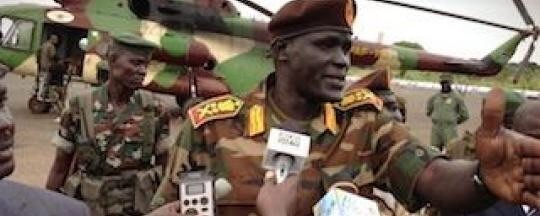As many as several hundred boys have been forcibly recruited as child soldiers in South Sudan’s Upper Nile State this month and are undergoing military training. Relief agency UNICEF announced today it was “confident” in identifying the forces of General Johnson Olony as being responsible for having recruited these children.
Radio Tamazuj takes a look at the commander named by UNICEF:
–Johnson Olony is a Major General in the Sudan People’s Liberation Army (SPLA).
– SPLA is the military that was given status as the official national army of South Sudan after independence in 2011. In some press reports, SPLA is referred to as SPLA-Juba to distinguish it from other armed groups also self-identifying as SPLA, including SPLA-IO and SPLA-N.
– Maj-Gen Olony reports to Lt-Gen James Ajonga Mawut, Deputy Chief of Staff of Operations. In Upper Nile State, he is also outranked by the sector commander, Lt-Gen Johnson Gony Biliu.
– Olony formerly belonged to a loose rebel coalition called SSDM/A which fought the South Sudanese government from 2011 into 2013. His forces consisted of ethnic Shilluks and were mostly active in Manyo and Fashoda counties as well as Sudan’s South Kordofan State.
– He was amnestied by President Salva Kiir by presidential decree in April 2013. He moved his forces from Sudan into South Sudan in June 2013 after accepting the presidential pardon.
– Olony began the process of integration into SPLA in mid to late 2013 and came to Juba to negotiate the terms of the integration of his troops. By the time of the December 2013 crisis, not all of the administrative particularities regarding integration of his troops had been completed.
– This helps to explain why Olony’s forces throughout 2014 and into early 2015 were still sometimes referred to as a distinct armed group or “militia”. By now, formalities of the integration process have been largely completed.
– After the rebellion in Upper Nile in December 2013, Olony remained loyal to the government. When he was wounded in fighting in Malakal in February 2014, Radio Tamazuj identified him as an ‘SPLA general’. He recovered from his wounds and returned later to his command position.
– At a government Independence Day celebration in July 2014, Olony told crowds that he had a “doctorate in fighting”. This was interpreted both as a boast and an implicit rebuke to a number of well-known exiled or opposition Shilluk politicians who hold PhDs.
– Olony hails from Panyikang County of Upper Nile State. He is ethnically Shilluk.




